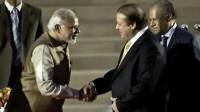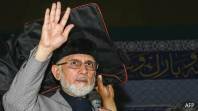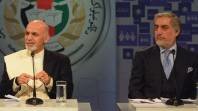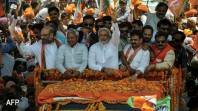Will India-Pakistan relations improve under the new BJP government, with Narendra Modi becoming the Prime Minister with a majority in the Indian Parliament? Will he follow the Vajpayee way in taking certain bold measures and repair the relations that remain strained since the terrorist attacks on Mumbai in 2008? Or will he pursue a hostile policy towards Pakistan, supported by or under pressure from rightist Hindutva elements in India?
The above concerns have been raised within Pakistan before, during and after the Indian elections. When Pakistan conducted a successful election and an orderly democratic transition from the previous government to the new one under the leadership of Nawaz Sharif last year this time, none within Pakistan expected that in a span of one year, India would witness the collapse of Congress and the resurgence of BJP with Narendra Modi as its supreme and undisputed leader.
Many not only within Pakistan but elsewhere as well were anxious about Modi. Perceptions about Modi were polarised between two extremes, one perception was of a morally questionable man who was behind the Godhra carnage, and the other was of a strong and successful Chief Minister of an Indian State (Gujarat) who provided good governance, economic revival and service delivery. So what model would he pursue at the national level, now that he has become the Prime Minister? Will he pursue the Godhra model, or will he be a national reformist?
It is unfortunate that views on Modi are so strongly polarised. The truth is rarely found in extremes. Internal politics, institutional biases and the stated ideological positions of many analysts colour their opinion in terms of how they project Modi as the Prime Minister, and how he will deal with domestic politics and international relations.
Based on observations of his style of functioning one could conclude that he will remain a strong leader, not afraid to take tough decisions and implement them from top to lower tiers of governance. Secondly, he also picks the right horses for the right courses, especially in bureaucracy, he gives them space and expects them to deliver on their own terms; he doesn’t impede their functions for political expediency.
Besides being a strong leader, he is also known to allow institutions to build, function and deliver. In this context, Modi will be the complete opposite of the previous Prime Minister, Manmohan Singh, who did not want to take tough decisions on economic and political fronts, and allowed political scuffles to result in bureaucratic inertia.
With specific reference to Pakistan, based on the above, one can make some likely predictions. Economy and governance, rather than ideology will be the basis of his relationship, not only vis-a-vis Pakistan, but the entire neighbourhood. This does not mean that he will go back to the old rhetoric of culture and history as a common bridge and denominator between India and it neighbours, as IK Gujral would have wanted. Rather, he will pursue the Vajpayee model in terms of pursuing relations with the neighbouring countries, based on merit, economic cooperation and reciprocity.
Certainly, resolving the Kashmir problem once and for all won’t be his top agenda. Nor is he going to start with what is generally agreed as an easier problem to tackle – Siachen. He will mainly attempt to minimise the bilateral hostilities and enhance economic cooperation to start with. While on traditional bilateral issues, he will likely wait and adopt a cautious strategy, only on certain big ticket items such as the Turkmenistan-Afghanistan-Pakistan-India (TAPI) pipeline, can one expect him to expedite the process.
As someone expected to lead the Indian economic revival and spur the growth rate, as a rule, one should expect Modi not to allow any ideological orientations taking supremacy over political and economic governance. Investments in bilateral and multilateral projects such as the TAPI and IPI, avoiding any confrontational politics with big powers such as China or the US for domestic consumption will drive his policies.
As someone who believes in the sanctity of institutions, he is also likely to closely consult all the NSA, External Affairs, Defence and Home before taking vital decisions about the region, especially Pakistan. While the above institutions need not necessarily speak in one voice, the previous government used the internal differences within institutions as an excuse for not taking any decisive decisions – whether political, economic and military. Narendra Modi is unlikely to pursue such a strategy.
Modi faces three major challenges regarding Pakistan: first, the civil-military divide within Pakistan and how far Modi will be willing to work with Sharif or go along with investing in a democratic government that cannot take vital decisions, or worse, cannot deliver on agreements already reached upon.
Everyone in India knows the lopsided situation within Pakistan in terms of the civilian government and the military establishment. Modi is not a man with the patience to wait until the democratic government is strong enough to deliver on bilateral issues.
Second, how far will Modi’s own party allow the ingress from Pakistan on the Indian investments in the region, especially Afghanistan?
While India should understand and appreciate the concerns of Islamabad in Afghanistan in this context, any attacks on Indian investments will be seen as the result of interference by the Pakistani establishment.
This is where substantial political and economic investments in the IPI and TAPI will make the stakes high for both the countries to work together. While there are restrictions and reservations within Pakistan in providing the MFN status to India or building a larger bilateral economic relationship, big ticket items such as the TAPI and IPI will provide adequate leverages for both countries to work together even within Afghanistan. Much will depend on how successfully Modi is able to convince Pakistan in terms of working together over Afghanistan.
Third, the issue of cross-border terrorism; while India will like to share the pain of what Pakistan is going through in terms of the Pakistani Taliban, it will be difficult to expect the new government to restrain itself if there are further terrorist attacks on mainland India led by the Lashkar-e-Taiba or its surrogates.
Finally, certain pitfalls for Modi to avoid. For example, nuclear doctrines and the proliferation of armaments. Will he pursue a hostile nuclear doctrine, for example giving up the No-First-Use policy as has been already hinted? Though the BJP manifesto talks about a revision to India’s existing nuclear doctrine, one is hopeful it will be for the better, aiming at improving the prospects of deterrence. It is unlikely Modi will be chasing doctrines that might destabilise the region and undermine India’s economic growth.
India’s economic growth, political stability and good governance, rather than any military adventurism or ideological pursuits both in domestic and external politics will remain his basic approach. There should be a similar expectation within the moderate political leadership and a substantial section within the civil society in Pakistan as well – an emphasis on economic growth and political stability. The challenge is how Modi and Sharif will take their larger goals forward and battle negative influences from other institutions and groups.
Modi for sure, will not hesitate to take decisions. Nor will he allow himself to be pressurized from taking or not taking any crucial decisions by other institutions – formal or otherwise. Will Sharif have the same strength?
The writer is the Director of Institute of Peace and Conflict Studies (IPCS), based in India


















